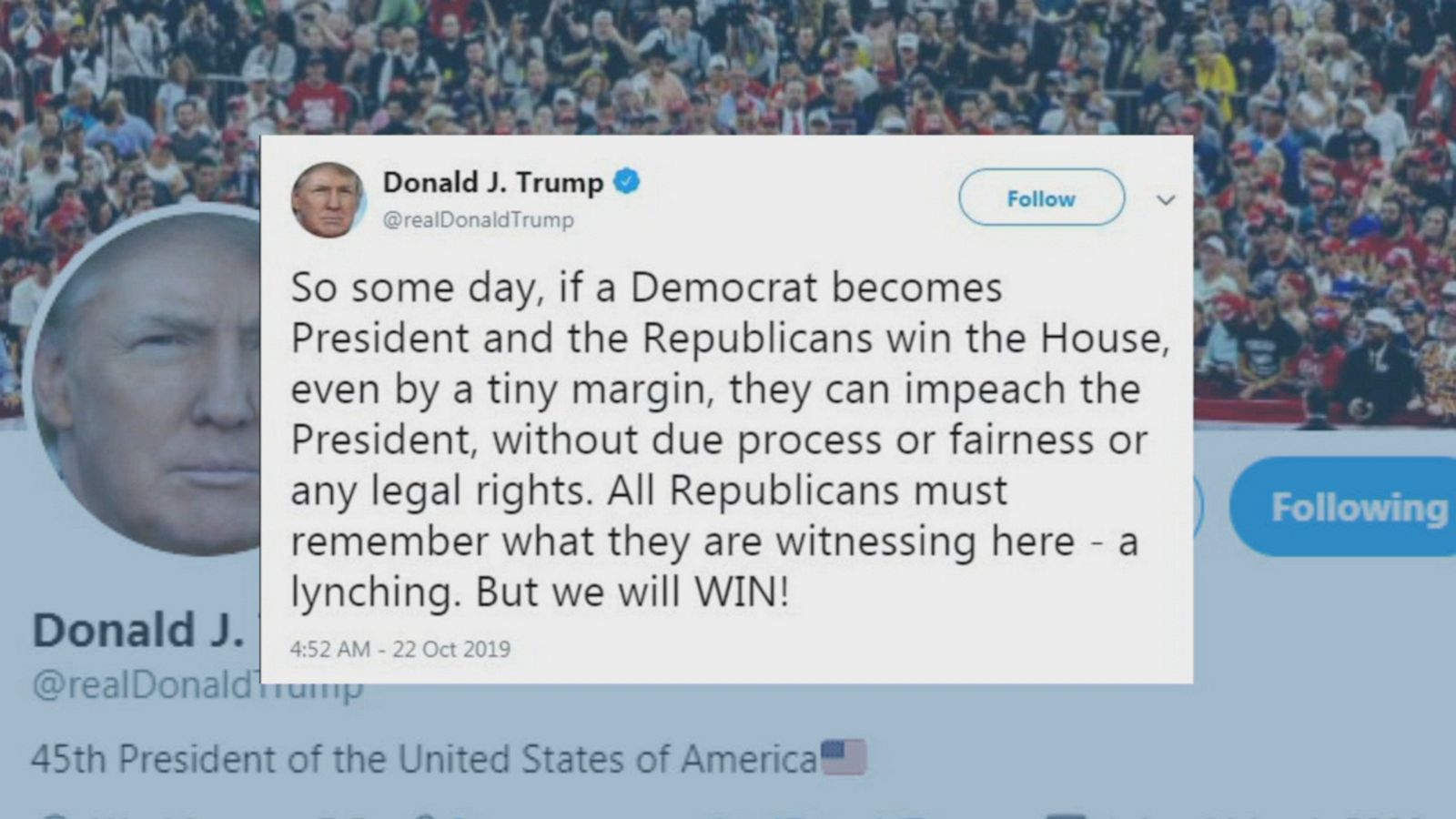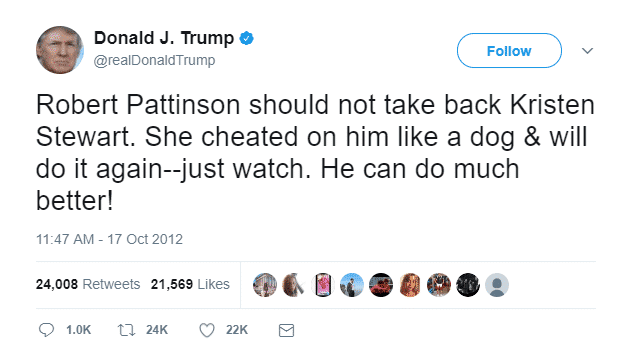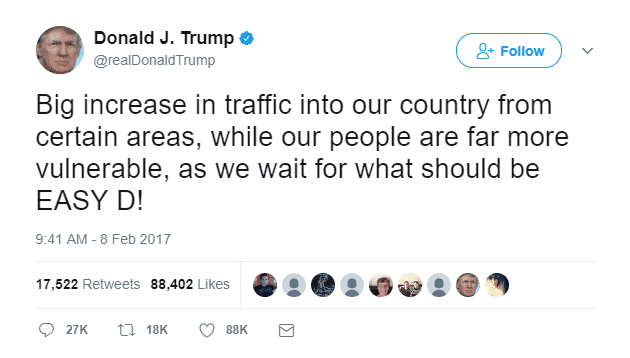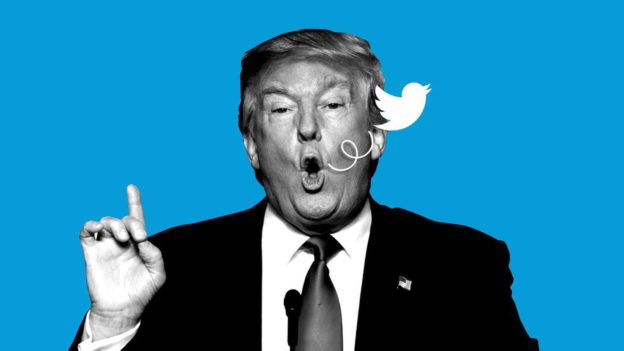
We at the HB hope you enjoy President Trump’s latest tweet, which has dominated the airwaves and frustrated staffers and spokesmen at Little Kremlin, er, the White House, since president Trump sausage-pecked it yesterday. It hopefully will be the last you see.
We plan to no longer quote his non-newsworthy tweets — i.e., nearly all of them — for the sake of our own sanity and the nation’s. From here going forward, we’re employing the LTC Policy regarding Twitter, as well as all Social Media.
LTP is an acronym for Limited Twitter Coverage. The policy calls for any tweet that is tantamount to an ad hominem attack on a person, group or cause to be stricken from news coverage. We invite our colleagues to do the same — not only to improve political discourse in America, but to re-institute a standard of values in U.S. journalism, which unfortunately has become a mirror of the people it covers.
You can use the latest tweet as reason enough for an LTC Policy, though we could have (and should have) implemented such a policy years ago. Precisely, three years ago. Remember covfefe? (“Despite the constant negative press covfefe.”) That was the tip of a cognitively dissonant iceberg. Here are just a couple of his Alzheimer-ish ramblings, in addition to the latest:

Yes, romantic loyalty is important, Mr. President.

Er…what? And who or what the hell is EASY D?
And so on. Books have been published about his “tweetstorms.”  A count by The Washington Post and New York Times found that the president has tweeted 17,000 times from 2015, when he entered the race, through July 2017. We must have passed 25,000 tweets months ago. Imagine the ink we’ve spent, the airtime hours we’ve wasted, just to cover his 3 a.m. rants?
A count by The Washington Post and New York Times found that the president has tweeted 17,000 times from 2015, when he entered the race, through July 2017. We must have passed 25,000 tweets months ago. Imagine the ink we’ve spent, the airtime hours we’ve wasted, just to cover his 3 a.m. rants?
Writing about Trump’s caustic journaling is a Faustian bargain. The devil pays well, but always collects. On the one hand, you could argue that America has a right into the insights of the man with the nuclear PIN code. Anything that exposes his predisposition, they argue, informs a voting public.
The argument’s not without merits. And that’s not to mention the money at stake from covering Trump’s tweets. Boiling blood always outsells coagulating, and CNN, MSNBC and about every other outlet in America would chop off its right hand rather than give up that cash cow.
But at what cost the cow? Does it not play into a simple-but-effective Republican strategy of getting beneath Democrats’ skin? Does it not make news coverage of the very subject numbingly repetitive? What’s worse: Are we discriminating against those who aren’t part of the Social Media ecosystem? They’re a larger group than you think: A full 78% of Americans aren’t on Twitter, according to a Pew poll. Yet 51% of Americans read tweets in the media, according to the same study.
What if we have been reeled in by the troller-in-chief? Consider the distraction the tweet caused: Instead of covering the plethora of scandals before us, we’re going ape shit over the word “lynching” and its meaning. Consider how the tweet was really a coded wink to his base: The administration can (and did) argue that the media was misconstruing him again while still giving a nod to Trumpkins. All while we chased cauldrons.
Speaking of which: For us reporters (it’s time we speak in the collective), tweets don’t it even pass basic reporting essentials, like attribution and sourcing. News outlets — particularly new and shiny digital ones — love to make a point of how hip and topical they are by quoting clever, anonymous Twitter users. You’ll see legitimate outlets quoting tweeters with identifications like or @centralsquarepigeon, or @LordVoldemort7, or @sarcasticrover, or on and on and on. Some have clever quips to make, some not so much. Either way, a reporter would be given a pink slip had he/she returned from a Man-on-the-Street story without real names, real attribution, anything that would give the interviewee reason to stand by his or her words.
To add to the confusion, Trump rarely tweets about anything of import. Other than lambaste investigations as witch hunts, when has he tipped his hand about anything controversial or even revealing? Before the Post story broke, were any of the 25,000+ tweets about Ukraine’s need to battle corruption? Any tweets about how his “internal tax audit” is going? Anything about his emoluments schemes (besides denying them)?
Even yesterday’s tweet could use a LTC Policy vetting. What exactly did the president reveal with that controversial missive? That he’s a racist? That he doesn’t know history? That he has no grasp of the definition of words (Webster’s definition of lynching: “(of a mob) kill (someone), especially by hanging, for an alleged offense with or without a legal trial).” Last time I checked, impeachment is a legal trial, and Trump still breathes.
This isn’t to say we should drop coverage of Twitter. It has become the White House’s de facto source of press releases, as opposed to news conferences. Foreign nations — most recently France and Brazil — have publicly bickered and delayed aid over perceived-offensive tweets. Cabinet hirings and firings are done by tweet (ask John Bolton). The #Metoo movement was an historical hashtag. And stories like the Vanity Fair article on Mitt Romney using the pen name @PierreDelecto helped to chillingly underscore the fear that runs through the GOP. They are legitimate stories.
But what are we really gaining with circus tent coverage over all administration tweets, besides misinformation? 24/7 news outlets have been quick to trumpet new ethics policies, including withholding the identity of mass shooters and not re-reporting thoroughly debunked conspiracy theories.
But that’s not nearly far enough. If we hope to regain even a modicum of respect in the public’s eye, we’ve got to demonstrate some deliberateness in what we cover — if only to give the stories we do write sense of gravitas. It’s a counter-intuitive ask: to drop some stories simply because they don’t cut muster, even if it hurts our bottom line. But we do it with every other form of journalistic coverage, from entertainment to business to sports.
Why not the most important beat of all?

